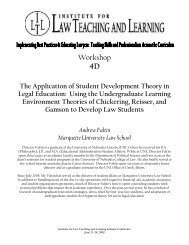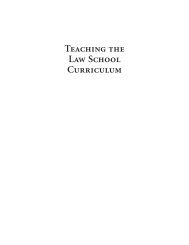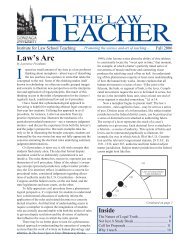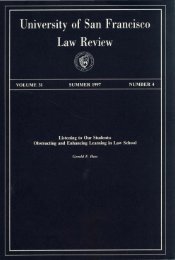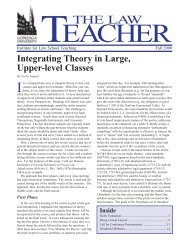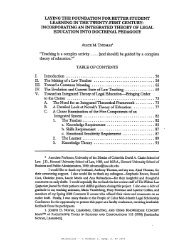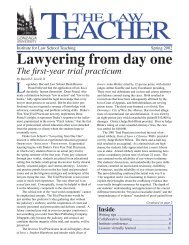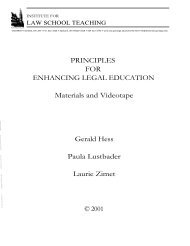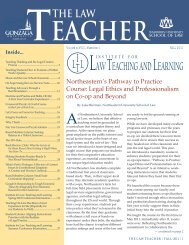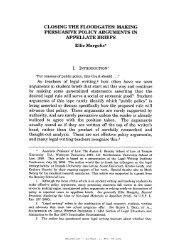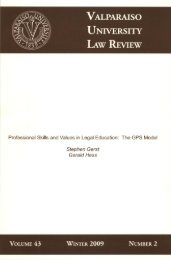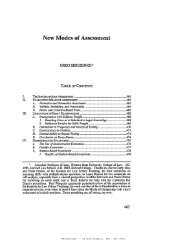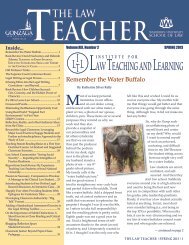The Law Teacher - Institute for Law Teaching and Learning
The Law Teacher - Institute for Law Teaching and Learning
The Law Teacher - Institute for Law Teaching and Learning
Create successful ePaper yourself
Turn your PDF publications into a flip-book with our unique Google optimized e-Paper software.
academic Support Methods in the h<strong>and</strong>s of Doctrinal Professors: Tricks of the<br />
aSP Trade <strong>for</strong> assisting Underper<strong>for</strong>ming Students<br />
— continued from page 14<br />
organizing the legal doctrine will help<br />
professors identify exactly why students<br />
might be falling short of the necessary<br />
comprehension. a doctrinal professor<br />
could credibly require students seeking a<br />
meeting to come prepared with a written<br />
study schedule so the first few minutes<br />
could be spent assessing whether<br />
enough time is being spent on the right<br />
tasks. Further, doctrinal professors could<br />
require students to write out a list of<br />
issues they hope to cover in their time<br />
together to make sure that both parties’<br />
time is being well spent.<br />
Self-regulating <strong>Learning</strong><br />
although the <strong>for</strong>mal substance of what<br />
I do with each student depends on that<br />
particular student’s needs, there are<br />
certain preliminary strategies I employ<br />
with all of my students. For example, we<br />
always begin by reviewing completed<br />
exams in depth together. I ask my<br />
students to obtain <strong>and</strong> review their<br />
exams prior to our meeting, self-assess<br />
their strengths <strong>and</strong> weaknesses using a<br />
self-assessment <strong>for</strong>m I provide, <strong>and</strong> come<br />
prepared with questions. Spending the<br />
time engaging in this analysis gives the<br />
students an opportunity to self-reflect<br />
<strong>and</strong> become engaged in the important<br />
process of monitoring their learning <strong>and</strong><br />
building self-regulation skills. During<br />
our meeting, I go through the exam with<br />
the student, diagnosing mistakes <strong>and</strong><br />
connecting strategies back to what I have<br />
taught in academic excellence class.<br />
This helps guide the students as they<br />
learn to recognize <strong>and</strong> correct their own<br />
mistakes.<br />
I also have students complete practice<br />
multiple choice questions regularly.<br />
after completing the questions they<br />
review the answers <strong>and</strong>, next to each<br />
problem they answered incorrectly, I<br />
have them explain in their own words<br />
why they got it wrong so that they are<br />
able to demonstrate their newfound<br />
underst<strong>and</strong>ing of the concept to me.<br />
This process helps them both to gauge<br />
whether they underst<strong>and</strong> the material<br />
<strong>and</strong> remedy any comprehension<br />
problems they are having as they<br />
encounter them. I remind them that<br />
these problems can later be incorporated<br />
into their outlines as hypotheticals to<br />
illustrate the principles at play. writing<br />
essays is also something my students<br />
practice regularly, <strong>and</strong> it is connected<br />
to the exercises they are simultaneously<br />
completing in our weekly academic<br />
excellence class. <strong>The</strong> students that I work<br />
with one-on-one are required to submit<br />
their essays to me in advance of our<br />
meetings so that I can provide detailed<br />
comments <strong>and</strong> feedback when we meet.<br />
<strong>The</strong> common thread running through<br />
all of these strategies is that I require<br />
my students to evaluate their own work<br />
critically, comparing their answers to the<br />
model essays <strong>and</strong> evaluating whether<br />
their difficulties are substantive or<br />
structural. <strong>The</strong> more they self-regulate,<br />
the more they build the tools crucial to<br />
success <strong>and</strong> are able to take what we are<br />
doing together <strong>and</strong> do it on their own<br />
effectively.<br />
Doctrinal professors might consider<br />
having students complete these types of<br />
exercises as a precondition <strong>for</strong> meeting<br />
to ensure that students come prepared.<br />
Bringing specific questions from practice<br />
problems provides natural launching<br />
points <strong>for</strong> substantive discussions on<br />
doctrine. Time together will be focused<br />
on actual legal issues <strong>and</strong> the number<br />
of times a professor is faced with “I<br />
just don’t get it” will be significantly<br />
reduced. Instead, the student can<br />
articulate what it is she is not “getting”<br />
using concrete legal examples, <strong>and</strong> the<br />
professor can help clear up doctrinal<br />
confusion within the specific context of<br />
those examples.<br />
Putting it All Together<br />
<strong>The</strong> factor that I believe contributes<br />
most significantly to the success of my<br />
students is the feeling that someone<br />
at the law school is on their team <strong>and</strong><br />
rooting <strong>for</strong> them. while this role is one<br />
that is often played by academic support<br />
professors, there is no reason that<br />
doctrinal professors cannot play a similar<br />
role.<br />
Students can continue to benefit from<br />
participating in academic support<br />
programs as they transition from<br />
their prior learning experiences to<br />
the unique rigors of law school. That<br />
said, it is my hope that some of the<br />
bumps they experience on their journey<br />
can be smoothed out by interactions<br />
with doctrinal professors who have<br />
incorporated a few of our tricks of the<br />
trade into their student interactions…<br />
<strong>and</strong> likely ended up with some academic<br />
support “swagger” to go along with<br />
their innate lecturing abilities <strong>and</strong> subject<br />
matter expertise.<br />
____________<br />
Elizabeth Bloom is assistant director,<br />
Academic Excellence Program at the New<br />
Engl<strong>and</strong> School of <strong>Law</strong>|Boston. Contact her<br />
at ebloom@nesl.edu.<br />
<strong>The</strong> <strong>Law</strong> <strong>Teacher</strong> | FaLL 2012 | 15



